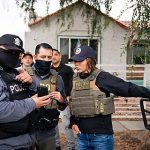
Qatar’s Dukhan Airbase is not the most picturesque, but it came alive on a fine day in September 2022 when the Emir, Sheikh Tamim ibn Hamad Al Thani, took delivery of $5 billion worth of British-built Eurofighter Typhoons.
Sheikh Tamim had purchased twenty-four in total – each one a product of BAE Systems, the UK’s largest arms manufacturer – cementing Qatar’s status as the premier destination for British weaponry that year.
Much ink has been spilt in the past decade over the small Gulf state’s consistently abhorrent treatment of minorities and foreign workers, as well as its closeness with terrorist groups from Hamas to Iran’s Islamic Revolutionary Guard Corps (IRGC).
Arms exports have always been part of the story, but there has been little to no progress in holding British politicians to account for their continued acquiescence to Qatari demands for arms in spite of ongoing and fierce opposition from civil society.
This isn’t just a matter for left-wing campaign groups. Right-wing hawks should be equally concerned that BAE Systems and others continue to provide state-of-the art weaponry to a country that in 2022 – the latest figures available, I’m afraid – sent more than half the weapons it had purchased to countries designated ‘not free’.
$2.7 billion worth of the stuff in gross terms, which makes for grim reading. What is equally confounding is that this morally dubious (arms) trading relationship has been in place for so long.
As far back as 1996 it was revealed that the then Foreign Minister of Qatar Hamad bin Jassim bin Jaber Al Thani – who latterly served as Prime Minister between 2007 and 2013 and is now known as ‘the man who bought London’ – was the beneficiary of a payment of £7 million to two financial trusts in the Channel Islands.
This payment, around which all parties involved deny wrongdoing, was made in the immediate aftermath of BAE Systems and Qatar signing an arms contract worth in excess of $500 million.
The contract was signed in the dying embers of the Major government and quickly raised suspicion and much moral outrage. However, enquiries by Jersey’s legal authorities were dropped under Tony Blair who intensified ties with Hamad bin Jassim (‘HBJ’ for short) still further in his quest to exert British power in the Middle East.
This trust was proven to be misplaced as soon as 2000 when Qatar, with HBJ still its top diplomat, began to heavily arm the Algerian government despite it being under Western sanctions for its dire record on human rights.
And now, more than two decades later, Qatar remains firmly in the bosom of the British establishment. Indeed, it was only in 2022 that HBJ submitted a highly competitive bid to buy Manchester United, whose strikers may not be as spiteful as BAE System’s but would have been a solid acquisition for PR purposes, nevertheless.
It doesn’t take a great cynic to see why UK-Qatar ties haven’t soured despite the trail of gross improprieties. British arms exports obviously serve an economic purpose – especially in difficult times – and the UK’s reliance on the gas-rich state for energy supplies is well-known.
But it would be a grave mistake to view the relationship as a simple two-way street based on mutually beneficial trade and investment; there’s clearly something darker at play.
Take the fifty-eight British MPs who have been flown to Doha at Qatar’s expense since 2010, according to the Guardian. A subsequent analysis by its sister paper, the Observer, found that MPs ‘appeared to speak favourably’ of Qatar after experiencing these perks.
And then consider the buying up of great British brands. Jim Ratcliffe may have pipped HBJ to the post to buy United, but Qatar now owns Goodwood, Harrods, and the Shard as part of its £10 billion UK property portfolio.
Qatar’s influence over the UK is pervasive, therefore, and it is influence that the Gulf state craves most.
How can we know for sure? The billions spent on British-built fighter jets is the perfect example: Qatar could easily afford those jets, but the point is that it didn’t need them. Its air force had already taken delivery of American F-35s and aircraft from France’s Rafale.
The reason for the deal, therefore, is that Qatar’s leadership knows full well that a large order from a British firm serves as a deposit for the next time it needs to exercise leverage in the West. And so the deal went ahead.
We know that Qatar is hardly shy about expending this leverage, using it to slip off the hook for its close ties with terrorist groups from Al-Nusra in Syria to Hamas in Gaza. It also proves useful to continuing close ties with Iran, an international pariah that brutally represses its citizenry and causes havoc abroad.
With this in mind, the question on so many lips is why the UK continues to sell arms and fraternise with Qatar in spite of corruption and myriad misdoings, but the answer cannot simply be economic self-interest.
Instead, there exists a deep and pernicious influence over the UK that persists in the face of well-founded moral and strategic concerns. Our government needs to cut out this influence – root, branch, and gold leaf – and must do so now.
Read more:
The UK continues to sell arms to Qatar despite corruption and misuse. Why?







